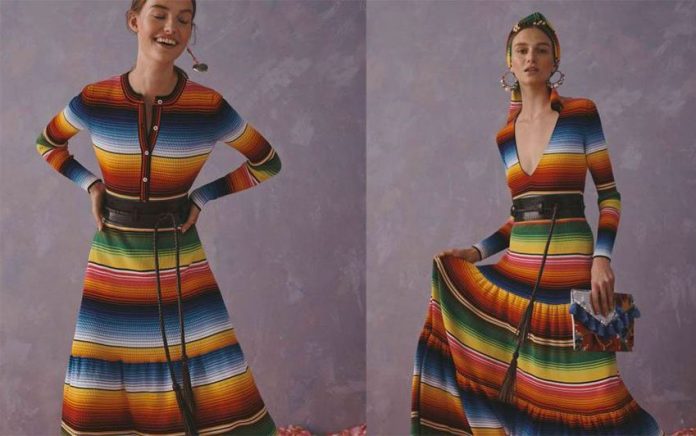Another major international fashion designer is in hot water in Mexico over cultural appropriation, having been accused by the federal government of plagiarizing indigenous Mexican designs for its latest catalogue.
In a letter published in the Spanish newspaper El País, Culture Secretary Alejandra Frausto asserted that several articles of clothing featured in Carolina Herrera’s Resort 2020 collection copied liberally and without due recognition from designs used in indigenous textiles from several regions of Mexico.
“Some of the designs used in the collection form part of the world view of indigenous peoples of specific regions in Mexico.”
In her letter, Frausto pointed to specific examples, citing two dresses that use a design typical of the famous serapes and ponchos made and worn by indigenous people in Saltillo, Coahuila, a dress with a distinctive floral pattern employed by indigenous women in Oaxaca’s Isthmus of Tehuantepec and another dress with a pattern identical to embroidery work used by an indigenous community in Hidalgo.
“This pattern comes from the community of Tenango de Doria in Hidalgo. Contained in these patterns is the very history of the community, and each element has special personal, familial and communal significance.”
A brief introduction in the Carolina Herrera catalogue claims the collection was inspired in “a sunrise in Tulum, the light of Lima, a stroll through Mexico City . . . and the colors of Cartagena.” Vogue magazine called the new collection “young, fresh and true to the brand’s roots.”
But Frausto was not convinced and in her letter demanded a public explanation from Venezuelan-born Herrera and the design firm’s creative director, Wes Gordon.
She wants to know what led the collection to use patterns with clearly documented indigenous origins and indicate whether they intend to compensate the indigenous communities and original designers with funds generated from the collection’s sale.
“This is about an ethical principal . . .” Frausto wrote, requiring the attention of the United Nations panel for sustainable development.
This is not the first time that major designers and clothing lines have found themselves at the center of controversy for copying indigenous Mexican designs. Zara, Mango, Isabel Marant, Louis Vuitton, Michael Kors and Etoile have all been criticized in the past.
Oaxaca musician-turned senator Susana Harp told El País that the Mexican government is currently working onlegislation that would grant intellectual property protections to the cultural knowledge and identity of afro-Mexican and indigenous groups.
The senator, who heads up the Culture Commission in Congress, said the law would allow indigenous communities to prohibit fashion designers from using their designs.
“These communities are asking for respect, they’re not [necessarily] asking for money. They want designers to come to them and ask for their permission.”
Harp said that not all designers copy indigenous designs indiscriminately without asking permission, highlighting French luxury furniture designer Roche Bobois, which pays royalties to huichol communities for every piece of furniture sold that incorporates their distinctive indigenous designs, and Mexico City designer Carla Fernández, who clearly acknowledges the origin of each piece of her collection.
Source: El Economista (sp), Expansión (sp), El País (sp)
